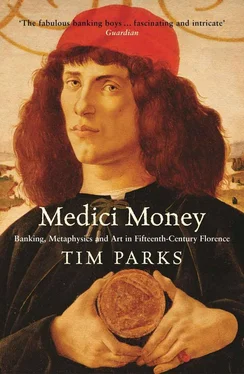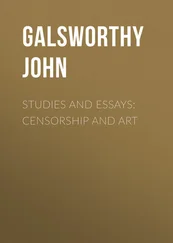But what were talent and calculation without cash? The usurer, the banker, is more dangerous, more powerful, when the traditional structures of society have given way. There is nothing now to obstruct the progress of money. There is nothing more solid and reliable now than the golden florin of Florence, on which, in defiance of ancient hierarchies, no sovereign’s head is stamped, just the name Florentia on one side and the lily, emblem of the city, on the other. With no king on his coins, the banker is more or less obliged to be a kingmaker himself. He funds this or that side, or is plundered by them. He either controls the fiscal system or he is taxed out of business. Needless to say, the literature of the time was full of attacks on the “lowborn pleb who rises from the depths to great prosperity.” Could anyone be more callous, wicked, and proud? “A couple of lengths of red cloth,” said the wry Cosimo de’ Medici, “and you have your nobleman.”
HERE IS A little poem written in the first half of the fourteenth century:
Money makes a man visible
Money makes him seem knowledgeable
Money hides every sin
Money shows what he buys and bought
Money gives him women to enjoy
Money keeps his soul in heaven
Money makes a nobody noble
Money brings his enemy down to earth
Without money a man seems stuck
Since it turns the world and fortune’s wheel
And, if you want, it’ll send you to paradise .
I reckon the man wise who hoards it up:
Since more than any virtue money
Will ward off melancholy .
Yes, it’s a scandal. But nobody is more excited than the person who has discovered a scandal. We sense the poet’s horrified enthusiasm. With money you can change your social position, you can have women and go to heaven. We must condemn this delirium, but actually we are thriving on it. This is the contradiction behind so much mental activity in the West. We love money and what we imagine it can do and buy, and at the same time we are haunted by a fear as old as Achilles: surely there must be some value that is beyond buying and selling, something beyond the art of exchange. Oh, but not something, please, that tells us that money is altogether evil, that the plague that took away my child is God’s punishment for my financial transactions.
Behind all this tension lies the conundrum of a religion that began by calling the Christian out of the world to live a life of poverty while waiting for the imminent Second Coming—“Blessed are the poor for they shall inherit the earth”—but then later and rather confusingly, when the Second Coming never came, became the religion of the establishment and the rich, of people entirely in and of the world. What could this lead to but hypocrisy? Or art?
“It is easier for a camel to pass through the eye of a needle than for the rich man to enter the kingdom of God.” Everybody knows that. Yet who was richer than prince and cardinal? Traini’s Last Judgment in Pisa shows the well-dressed merchants drawing back in dismay as ugly demons cart off the affluent damned. Those men wanted to go to heaven, but they didn’t want to stop doing business, if only because, as the humanist Leon Battista Alberti explained, a poor man can never “find it easy to acquire honour and fame.” Such is the divided consciousness of the banker in the fourteenth and fifteenth centuries, such the contradiction that over the years will encourage the cultivation of less disturbing nonmonetary values — in philosophy, aesthetics, and love.
WE KNOW THE men from their tax assessments. They were obliged to list their incomes and possessions. Spared that annoyance, the women leave only the value of their dowries. Giovanni di Bicci was not a pleb made good. The Medici had appeared often enough on the parchments that recorded the names of the so-called priors of the city, the nine men who formed the government. But he wasn’t wealthy either. He and his four brothers had to share the 800 florins their mother left at her death. Assessed for tax, Giovanni was found liable for a contribution of only 12 florins. But a distant cousin had to pay 220, a very substantial sum. Vieri di Cambio de’ Medici ran a bank. However distant, family tended to employ family. Both Giovanni and his elder brother Francesco were taken on, and in 1385, when his own marriage brought a dowry of 1,500 florins, Giovanni was able to invest and, moving south, become a partner — the executive partner, in fact — in the Rome branch of Vieri’s bank. The other things we know about Giovanni’s wife are that she was called Piccarda Bueri and that she bore her husband two sons, Cosimo and Lorenzo. But she didn’t live with him in Rome.
Rome was a political and economic anomaly. The people of Greenland sold whalebone in Bruges and had the money sent to Rome. The people of Poland shipped furs to Bruges, sold them, and had the money sent to Rome. Or, rather, to the Curia, the pope. The Church demanded its tributes from all over Christendom. While other states collected taxes only from their own citizens and often with great difficulty, Rome was drawing in money from all over Europe. On taking up his benefice, a cardinal, bishop, or abbot was forced to pay the equivalent of the first year’s income to Rome. Otherwise, he couldn’t take up his lucrative appointment. Money arrived from Scandinavia, from Iceland, from poverty-stricken Scotland. Delayed payment was punishable with excommunication. Don’t pay and you go to hell. Announcing an extraordinary jubilee, a papal messenger informs the people of Gand in Flanders that if, during a certain period, they come to mass and leave a generous offering for the war against the Infidel, they will be granted a plenary indulgence. Straight to heaven, no purgatory. The people cough up. Who wouldn’t? The messenger counts out the money, coin by coin, with an Italian banker, in Bruges. It is always an Italian banker. Where there is an Italian community, there is a chance of a bank. Where there is no Italian community, there is no bank. In any event, the money is sent to Rome.
One says, “the money is sent,” but in fact it was paid out on order to the Curia in Rome, either by a branch of the same bank that had received the money abroad or by a trusted correspondent bank. Actually to travel on horseback or by foot across Europe with money was dangerous. “Beware of rivers in flood,” one messenger is warned. “Go armed and in company.” So a pilgrim, or priest, or choirmaster traveling to Rome goes first to his nearest bank, in London, Bruges, Cologne, Avignon — except for Constantinople, there are no banks east of the Rhine — buys a letter of credit, travels to Rome, and cashes it on arrival. A little is lost on the exchange rate, a little is paid in bank services, but he cannot be robbed. More than any other organization, it is the Church, then, that, despite its condemnation of many banking practices, needs and stimulates the growth of the international bank. Because the Church is the largest international economic entity. It will be hard for the pope to send to hell the people who collect his taxes and make his grandiose projects possible.
And more than any other organization, it is the Church that aggravates the difficulties of balancing the cash flow around Europe. For how can the banks in Rome continue to pay out Church tributes collected elsewhere if they don’t take in any cash? There is already a trade imbalance between Italy and northern Europe. London and Flanders are buying silks, spices, and alum from and through Italy in considerable quantities, but all they have to offer in return are raw English wool, some wall hangings, some Dutch linen. However many of these things they send, it never seems to amount to the value of what they want to buy. Already, then, more money has to be brought into Italy, in coin, than sent out of it. The Rome anomaly makes the situation worse; the papal court is sucking in huge quantities of cash and not sending any back. What arrives in Rome is spent mainly on luxury goods — heavy brocades, silks, artwork, and silverware — and these don’t come from Northern Europe.
Читать дальше












